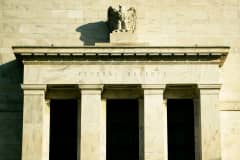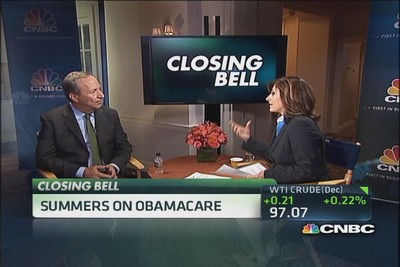Fed sets tough tests in annual bank health war games
|
|
|

Andrew Harrer | Bloomberg | Getty Images
Banks in the United States will have to test whether they can survive a halving of the stock market during a severe U.S. recession, the Federal Reserve said on Friday, as it set the rules for next year's model runs to gauge the health of the financial system.
Eight large U.S. banks must also test for the first time whether they can cope with the hypothetical default of their largest trading partner, the Fed said in documents laying out the so-called "stress tests."
(Read more: Policing banks: Federal regulators' big fail)
"The capital planning and stress testing program ... has contributed to a significant increase in capital at the largest banking organizations in the United States," the U.S. central bank said in a press release.
The stress tests were mandated by the Dodd-Frank law—aimed at preventing a repeat of the 2007-09 credit crisis - and measure how a bank's loan books and security portfolios hold up under a range of adverse economic scenarios.
Summers: Dodd-Frank has accomplished a 'great deal'
Former director of the National Economic Council Larry Summers says Dodd-Frank has accomplished a lot. "Too big to fail still is an issue and concern," he adds.
The Fed turned downCitigroup's plan to return equity capital to shareholders last year on the basis of the outcome of the stress tests, which it uses to approve or disapprove dividends or share buy-backs.
In March, the Fed will publish the results of the tests in two stages, one as mandated by Dodd-Frank and a more elaborate one to approve the capital plans, known as the Comprehensive Capital Analysis and Review, or CCAR.
The Dodd-Frank stress tests function as one of the inputs for the wider CCAR tests, the Fed said.
Thirty banks are taking part in the stress tests, 18 which have already taken part in previous runs, and 12 smaller banks which had so far only been subject to a lighter version of the stress testing exercise.
(Read more: Should US be treated like an emerging market?)
The most severe adverse scenario assumed a 4.75 percent contraction in the U.S. economy, a stock crash, a jobless rate peaking at 11.25 percent in 2015, recession in Europe, and a slowdown in emerging markets.
Six large Wall Street banks with large trading operations also had to factor in a global market shock including sudden shifts in interest rates, a sovereign crisis in the euro area, and an asset price shock similar to that in 2008.

No comments:
Post a Comment